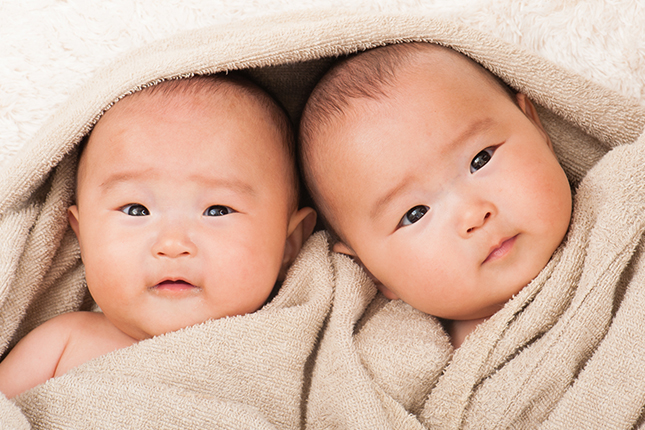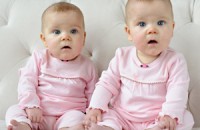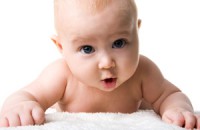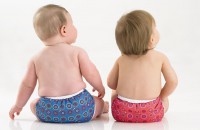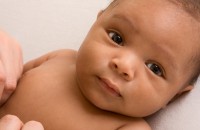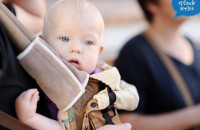Twin Talks
DNA Zygosity Testing for Twins
[00:00:00]
Please be advised, this transcription was performed from a company independent of New Mommy Media, LLC. As such, translation was required which may alter the accuracy of the transcription.
[Theme Music]
CHRISTINE STEWART FITZGERALD: Do your same sex fraternal twins look very much alike? Have you ever wondered if they are truly fraternal? Or perhaps they are identical? Perhaps you've considered DNA testing but have reservations about the process or the outcome. Can the new knowledge change the twin relationship?
Today we're talking about DNA Zygosity Testing for Twins. This is Twin Talks.
[Theme Music/Intro]
CHRISTINE STEWART FITZGERALD: Welcome to twin talks broadcasting from the Birth Education Center of San Diego. Twin talks is your weekly online on the go support group for expecting and new parents of twins. I'm your host Christine Stewart Fitzgerald.
Have you heard of the Twin Talks Club? Our members get bonus content after each new show plus special giveaways and discounts. Subscribe to our monthly Twin Talks Newsletter and learn about the new episodes available.
Another way for you to stay connected is by our free Twin Talks App, it's available at the Android, iTunes and the Windows Marketplace. Well let's get started and introduce ourselves. Here in the studio we have with us today Sarah, you want to tell us about you and your family?
SARAH VICTOR ROBERTS: My name is Sarah Victor Roberts. I'm an Attorney by trade. I have identical twin boys that I obviously underwent DNA Zygosity Testing to figure out that they were identical and they are our only children.
CHRISTINE STEWART FITZGERALD: Alright, and with us our producers Sunny.
SUNNY GAULT: Hey guys, my name is Sunny and I'm producing today's show and I have four kids of my own. My oldest is 5, I have a 3 year old and both of those are boys. And then I have identical twin girls who are 2 and we knew actually probably 5 minutes after I have I found out I was pregnant with the girls they told me they were identical. So I was still early on, I was about 11 weeks or something like that so they could really see that they were in the same placenta, sharing the same placenta.
CHRISTINE STEWART FITZGERALD: Ahh, they knew early on
SUNNY GAULT: Yap, they did.
CHRISTINE STEWART FITZGERALD: And today on the phone with us is Christina Baglivi Tinglof and she's the author and the editor of Talk About Twins. So tell us a little bit of your story.
CHRISTINA BANGLIVI TINGLOF: Hi there! Well I'm a freelance writer and an author. I've written a couple of books on twins including Parenting School Age Twins and Multiples and Double Duty. I am the mother of 3 boys. Fraternal twins who are in college right down there in San Diego as well as a singleton who's a senior in high school.
CHRISTINE STEWART FITZGERALD: Wow! You're a boy mom. Alright.
[Theme Music]
SUNNY GAULT: Alright so before we kickoff our conversation today on DNA Testing. I found a news headline, this is one of those stories that honestly it's like really.... It's an amazing story, it's almost like too hard to believe, like to wrap your head around this. But it had to do with cells and DNA a little bit so I thought it was a good fit for this episode.
So the headline is Man's Unborn Twin Father's His Baby. Wrap your head around that. So here's what happened. 34 year old man and he learned he is a rare human chimera which means he absorbed his twin early in the womb. So here's what happened, so this guy and his wife apparently they live in Washington State and they conceived their first baby through IVF with the help of a Fertility Clinic. And then when they learned that their new baby didn't have a blood type that match either theirs.
CHRISTINE STEWART FITZGERALD: Do you think there's some kind of lawsuit?
SUNNY GAULT: Scandal. So they though the clinic made a mistake but the clinic checked everything and they're like, "No, you're the only white male that we did this procedure on that day." So they were trying to figure out what the problem was and as it turns out. Says in an at home paternity test confirmed their disturbing suspicion that the man was not the baby's father. A second test administered by a lab returned the same unsettling results and as it turned out the blood type was actually from his twin that he absorbed. Does that makes sense?
CHRISTINA BANGLIVI TINGLOF: Yes.
SUNNY GAULT: So I know it's really hard to kind of wrap around your head around this. He didn't even know that he was a twin, right? And in fact the article actually says that's believed that one in eight births start in a multiple pregnancy. And as far as this human chimera (I'm just going to pronounce it that way) is concerned there's only 100 reports of it ever happening.
CHRISTINA BANGLIVI TINGLOF: Right. Very rare.
SUNNY GAULT: So he didn't know he was a twin. Very rare and then he goes to have a baby with his wife and the blood isn't his or his' wife and they're trying to figure out and it happens to be his twin he never knew. I mean seriously, this is so bopper stuff. It is, it's crazy. And it says, I once was just blown away by it. Like I'm blown away again just reading this article. Geneticists are blown away by this and it crazy?
CHRISTINE STEWART FITZGERALD: Wow. I've heard about women carrying like DNA from they've had like male DNA because... I'm just trying to remember like how it happened like breastfeeding mothers that can like they can get it done but...
SUNNY GAULT: Yeah, we've talked about that.
CHRISTINE STEWART FITZGERALD: But I've never heard of like a man having DNA from any skin or ...
SUNNY GAULT: Can you imagine it comes back and it says that you're just like, "Okay, someone made a mistake here?" And then that's how you find out that you were twin? Crazy! So now's everyone going to be thinking about that the rest of the day. How does that happen? I'll post a link on our Facebook page. So you guys can check out the article.
[Theme Music]
CHRISTINE STEWART FITZGERALD: So were here today with our Twin Expert Christina Bagilivi Tinglof who has authored several books about twins and she's here to talk about the DNA Testing of twins. So I know and you've written a couple articles and blogs and talked about DNA Tests and I think actually I think I was on your one of your subjects in your article.
CHRISTINA BANGLIVI TINGLOF: Yes, I have interviewed you for one of my article.
CHRISTINE STEWART FITZGERALD: Yeah, that's how we connected. So I mean, is this idea of having like a misdiagnosed twin does that seem to be common from your experience in talking to families?
CHRISTINA BANGLIVI TINGLOF: Well they say about 15 percent of identical twins think they're fraternal. I mean that's pretty sizeable, why I would say?
CHRISTINE STEWART FITZGERALD: Yes and I think that... Now I'm going to guess I'm kind of going... I mean that there are a lot of misconceptions both from parents and then even the doctors themselves. I don't know but why does that happen?
CHRISTINA BANGLIVI TINGLOF: Well I think it starts with the doctor because a lot of doctors are not well versed in twinning and the physiology surrounding it. For instance when you talk about twins there are about 25 percent of identical twins who actually have separate placentas. But some doctors don't realize that and they think, "Oh, 2 different placentas they have to be fraternal so they tell the moms that and the dad that when the twins are born the parents just accept it and go on with life and that's how we put so much stock on what our doctors says.
And some people just don't go ahead and investigate themselves that they just take the doctors says it as the truth. But really the doctor may not that be well versed in what's going on either.
CHRISTINE STEWART FITZGERALD: Oh, right. Exactly! And you know I think just for the listeners maybe we can take a little refresher course on talking about the different kinds of twins so we can have the... because we hear di-di-mono-di. I'm like wait what does that all mean?
CHRISTINA BANGLIVI TINGLOF: Well it get a little confusing but monozygotic means identical twins and dizygotic means fraternal twins. “Mono” meaning one, “di” meaning two so when there's one egg fertilized by one sperm that results in an identical twins or monozygotic twins. Two eggs, two sperms fraternal or dizygotic. But then it's get complicated because with identical twins then there's sometimes as you just pointed out that normally twins have two separate chorions and two separate amniotic sac. And that's the term that we coined dichorionic, diamniotic and that's the majority of twins.
So identical twins as well as fraternal twins. Then with identical twins they can be monochorionic and diamniotic meaning that the mono-chorionic twins share the same placenta but they have two amniotic sac. And then the third kind is the mono-chorionic twins that they share one amniotic sac. And so that's where the confusion gets with doctors they don't exactly, they're not well versed in this area.
CHRISTINE STEWART FITZGERALD: So maybe the doctors are kind of thinking that the majority of identical twins either share an amniotic sac or placenta.
CHRISTINA BANGLIVI TINGLOF: Exactly and that's not always the case because some identical twins... the majority of identical twins I should say have separate chorions and separate amniotic sac. I think it's about 25 percent actually.
CHRISTINE STEWART FITZGERALD: I think I've heard it's even it's kind of an evenly split but yeah something like that 40 percent of all identical have their own placenta and then yes the doctors just automatically assume, "Oh if you have it the same placenta then oh you're fraternal.
SUNNY GAULT: The way it was explained to me is that it's really hard to determine what as far as you being in separate sex or whatever after a certain point like the early you are in the pregnancy the easier for us to be able to determine that. If they write it off in the beginning as fraternal set then that was you're told and then before you know it you're on your third trimester then it's really hard to tell.
CHRISTINA BANGLIVI TINGLOF: And so a lot of women especially if you're younger they don't get into the doctor right away or if you're not expecting to be pregnant they don't get to the doctor right away. Whereas myself I was in the doctor’s office at 6 weeks because I was trying to get pregnant and so you made a valid point there that it's much easier to see the division when an ultrasound when you were very early in the pregnancy. And the later in the pregnancy it's harder to see many things because the twins begin to crowd the womb.
CHRISTINE STEWART FITZGERALD: I had the experience too for me. I was at the 8 week, the first appointment. I remember of course the ultrasound and "Oh there's 2 in there." That whole thing but then I remember my doctor telling me, "Oh yeah there's a really strong division talking about the sac so that must have been early on. We're 90 percent sure that they are fraternal.
CHRISTINA BANGLIVI TINGLOF: Right and then of course it turned out differently, didn't it?
CHRISTINE STEWART FITZGERALD: Yeah, so how about Sarah for you what was that in the initial appointment I mean. How did they describe it?
SARAH VICTOR ROBERTS: Well I mean after she said there's two I kind of went black. I just had it with the nurse practitioner which was my practices standard, your first appointment, you did an ultrasound, you had a nurse practitioner. We didn't go into any of the fraternal, identical or anything like that. It was my curiosity, my Googling. Google educated on this. Where I tried figuring out what would be the possibilities and really it wasn't till after I found out the genders that I really was curious whether or not I'd have identical or fraternal.
CHRISTINA BANGLIVI TINGLOF: And another thing that's interesting too when in talking about like when the baby's come home. Identical twins often look very dissimilar when they're born and then they grow up to look more similar whereas fraternal twins it's the opposite. When fraternal twins are born they often look a lot more alike and when they grow up begins to change. So that once again when you bring 2 babies home and you say, "Well they look so different, how could possibly be they identical?
SARAH VICTOR ROBERTS: That's actually what happened with my boys. I was still convinced they were fraternal because when I had them, we brought them home, we had no problems telling them apart. It was very clearly this one this one is that one and it wasn't till about 6 months that the thought even cross my mind that they could be identical.
CHRISTINE STEWART FITZGERALD: I kind of the same thing and of course we could cheat a little bit because one of my girls had a little the stork bite on her abdomen. They're different and I could see the difference in their faces as well. So now I think you raise a very good point like that for me being told that they are fraternal I just never even consider and I had few people say they look like that they're very similar. Are you sure they are not identical. "Oh no-no-no, they just look alike."
CHRISTINA BANGLIVI TINGLOF: And then you are probably you got so used to it too and it's they say one of the deciding factors is that one of the questions... usually there is a questionnaire and they say one of the question is "Do other people often mistakes your twins?" And if the answer is yes, you might want to consider DNA Testing. Because as a parent you do see the subtle little differences in your twins so therefore you wouldn't be so prone to say, "Oh they're identical." Whereas for other people who don't see your twins so often look at them and go, "Oh my God they look so much alike, how can you tell them apart?"
CHRISTINE STEWART FITZGERALD: Now that's very true. Now you know I'm wondering, I have heard sometimes for higher risk pregnancies that there have been tests at birth to determine whether the twins are fraternal or identical.
CHRISTINA BANGLIVI TINGLOF: Yes, blood test but I think that's really the best way to tell if twins are identical or fraternal. I don't know if it's standard though that they do that at birth. I would think you would have to ask for it. It's probably an expensive test. But obviously as they get older there are those kits on the market now. The DNA test that you just do a cotton swab on the inside of the baby’s mouth and those are very accurate.
CHRISTINE STEWART FITZGERALD: Right, now definitely. Because I think that with the blood test, that's what kind of lead us to do doing the DNA Testing which is we found, we look at the birth records and the blood test it said that the other A. One was A+ and one is sort of I think they are kind of in a hurry and they forgot to put positive in that. The blood type is the same so therefore the possibility could be that they may be identical. Obviously if the blood type was different then that would eliminate the possibility of being identical. So that was what kind of led us to say, "we need to kind of think about this."
SARAH VICTOR ROBERTS: Well with my husband and I have the same blood type so we kind of just bypass that set and now have that one end up.
CHRISTINE STEWART FITZGERALD: When we come back we're going to talk about using actual DNA testing to determine twin zygosity.
[Theme Music]
CHRISTINE STEWART FITZGERALD: Well welcome back. Today we're talking with Christian Banglivi Tinglof about DNA testing to determine if twins are identical or fraternal. So we mentioned about this new DNA testing so maybe you can describe a little bit more about what it is then also why is DNA a determining factor?
CHRISTINA BANGLIVI TINGLOF: Well don't forget the science doesn't lie. The DNA is the determining factor for sure. There are several companies out there that it is very simple. I think it's around 100 dollars to 150. You can order a kit and then arrives in a mail and you just basically swab the inside of your baby’s mouth and then you send back the sample and within 2 weeks you'll get the results.
Most of the companies test for about 15 or 16 different genetic markers. And if all of them match then your twins are identical. Even if one or two don't match up they are not identical. So it's pretty straight forward there's not a lot of well maybe they are. It's very definitive.
CHRISTINE STEWART FITZGERALD: We went through it too. We just got the kits, swab their mouth and turned it in and I think we got an online report within just over a week, it was pretty quick.
SARAH VICTOR ROBERTS: I had a very similar experience just to found a place online. I just remember like we had to do two swabs each kid just to make sure you didn't mess up. And got an email with the result, it was pretty quick and pretty painless.
CHRISTINA BANGLIVI TINGLOF: And I'm sure very surprising.
SARAH VICTOR ROBERTS: Well what was interesting was that we had opened it up to an online poll for our family and friends as to what they are identical or fraternal. My husband and I still swore if they would be fraternal because we look at them and see the differences and the vast majority of our family and friends thought they would be identical.
CHRISTINA BANGLIVI TINGLOF: Well that's right, that what we were saying before exactly that's interesting.
SUNNY GAULT: So I actually have a question for everyone who have the test done. But besides being just enormous like curiosity factor. Were there like medical reasons or what was your reasoning wanting to know with 100% certainty what your twins were? Christine?
CHRISTINE STEWART FITZGERALD: Well you know I think for me I had heard from a number of outside folks from the local twins club, those who had identical twins of their own and I think they are some of the ones that pointed out, "You know they really look alike." I don't know if I see that it was the curiosity but I just felt like okay this is something we just need to resolve. I just want to know and I'm going forward and it's like well you know there might be some benefit from a health standpoint that if we know one has some prepensely for something and the other one probably would so I said, "Let's just solve the question."
SUNNY GAULT: Sarah the same thing?
SARAH VICTOR ROBERTS: Yeah very similar. I mean a lot of it is curiosity. A lot of it was I wanted an answer when the strangers on the street would say, "Identical or fraternal?" I mean I've actually got into verbal argument when they were very little with people going no they're identical, no their fraternal." So I wanted to defend that answer but back my mind it's something health related comes up I want to already have that answer.
CHRISTINE STEWART FITZGERALD: And is that what the kind of reasons you saw Christina when you've interviewed families for your article?
CHRISTINA BANGLIVI TINGLOF: Absolutely, people just want to know. And when you think about it, twins should know. I mean because it would do about all these research about our family history and our family roots. And my goodness the twin bond whether you're identical or fraternal that is who you are, that's part of who you are. I would think it would be very important for twins to know one way or the other.
CHRISTINE STEWART FITZGERALD: Absolutely. I have to say talking about sort of now that I know that they are about 18 months old when we did the tests and I've wondered you know does it change? That's kind one of the things that's going to change my view of them. I don't know if it so much change but I just feel a little more informed because I read all these studies about the different twin types and you know fraternal and identical to say well in this case maybe identical have more propensity for something.
So I feel like I'm better prepared knowing that... In the families you talk to did you find that they change their interaction with the twins or the twins relationship in anyway?
CHRISTINA BANGLIVI TINGLOF: I'm not sure about that but I just think exactly what you were saying that parents claim that they were more of like "Aha moment." That is all just made sense to them. That it all the puzzle pieces were now put together and they go, "Oh, that's why!" So it's just more it just made sense.
CHRISTINE STEWART FITZGERALD: So we didn't have any families that were maybe either really disappointed, "We thought that we were fraternal but they are really not."
CHRISTINA BANGLIVI TINGLOF: You now I don't think so because don't forget too identical twins are more genetically bounded than fraternal twins. I'm sure the relationship between the identical twins it's just once they found out "That's why we're still close, that's why we feel so at ease with each other. Okay, that makes sense."
CHRISTINE STEWART FITZGERALD: I can only imagine that especially for adult twins too as they get to be a little bit older probably be more reassuring for them to know. I don't know if in your experience if you talk to adult twins who were tested. What DNA testing it's only been around for not that long?
CHRISTINA BANGLIVI TINGLOF: It's mostly younger twins that I'm in contact with but on occasion I went to a couple of years ago I went to a genetic conference and it was all about twinning. And one of the doctors was explaining that for years they thought their daughter were fraternal and he came upon a colleague who was doing some testing of twins for whatever reasons and this second doctor convince the first doctor to get his daughters tested and they were in their twice when they found out that they were identical twins. And so he explained like everybody else that it just then it was one of those moments like, "Like ah okay well now it makes sense."
SUNNY GAULT: Well you know I think part of it is too, we as parents like we feel... We should know our children better than anybody else, right? And this is a really big chunk of information that's an unknown or could be an unknown. So if you're supposed to know your child or your children better than anyone else I would imagine that this is the missing piece that you're just like, "How do I do it if I don't even know what kind of twin they are?" You know what I mean? I think a lot of that needing to know because we're the parents we should know this stuff.
CHRISTINE STEWART FITZGERALD: And have that intimate relationship with them. Now I will throw out another thing when we found out they were identical for me personally it gave me a sense of reassurance because my husband and I thought well do we want to have more kids and... This is a true story. So I was already the advance maternal age. If they were fraternal twins then what's my chances of having another set of twins.
SUNNY GAULT: That's right when Mikaela was born as you found out they were identical and probably were not going to have twins again.
CHRISTINA BANGLIVI TINGLOF: That's a very good point
CHRISTINE STEWART FITZGERALD: My odds are the same of having... When you have identical then it's no higher than anybody having identical or having twins so that okay, I know I'm pretty safe.,
CHRISTINA BANGLIVI TINGLOF: You roll the dice again.
CHRISTINE STEWART FITZGERALD: Well I mean last question here wanted to think about. Are there any families that you've talked to who thought about having DNA Testing and they decided not to? Like they just didn't want to know. They elected not to.
CHRISTINA BANGLIVI TINGLOF: No, I just think it's one of those things where text that some family would say, "Ah we'll get around to it." One of these days, yeah we mean to do. We want to do it. I come across a lot of that because whenever I see twins that look alike and in my day to day life I always ask and part of me. I'm thinking a couple of families in particular. I always ask. "Are you going to test them because they look alike?" "Yeah, well get to it. One of these days." Some families thinks it's very important it's a top priority and other families they're curious but you know for whatever reasons maybe financial or it's just; one of those things that we'll get to it.
CHRISTINE STEWART FITZGERALD: They'll get to it someday.
SUNNY GAULT: That makes sense though because if they're older and they already have an established life like what will it really change at that point. Maybe the medical student side of thing if someone was having a condition and you might want to know that but if you're life is already... I'm thinking like grown-grown adult you know twins. It's different then you're twins were just born. They have their whole lives ahead of them and you don't know what's going to come their way. You know it's another thing when you know half your life didn't... Do you know what I mean like you're not a spring chicken anymore?
CHRISTINE STEWART FITZGERALD: I have to wonder though I mean as adults maybe don't want to change the relationship that they have. Maybe they are afraid of it.
SUNNY GAULT: They are happy with whatever it is. Why would you know knowing if were fraternal or identical that wouldn't change anything so maybe it's just wanting to keep status quo. They like status quo and they want to keep it. I love how were speculating and with all these things. I think they want this.
CHRISTINE STEWART FITZGERALD: I was thinking about the story that came out not too long ago I think it's from the New York Times where Nancy Seagal went to South America and found the two sets of identical twins who have been switched at birth. And so I think you know they're grown they are in their twenties and they thought that they had grown up with their fraternal twin their whole life or so they thought and then I don't remember what spark it but they've found out I think it was through DNA testing that they were not genetically related to the other... The twin they thought was their brother. And so then...
SUNNY GAULT: That's crazy.
CHRISTINA BANGLIVI TINGLOF: They've found several of those families.
SUNNY GAULT: It is sad.
CHRISTINE STEWART FITZGERALD: It is but they were reunited with their identical brother. But it was jargon because their lives were so radically different. I think they felt closer to their adopted family than they did to their identical twin brother.
SUNNY GAULT: Of course you don't know that other person.
CHRISTINA BANGLIVI TINGLOF: And the case that you're talking about I saw that as well. It was just a mutual friend who said, "Hey, you look like so and so a friend of mine." And that's how the ball began rolling on that one.
SUNNY GAULT: Can you imagine? My goodness.
CHRISTINE STEWART FITZGERALD: Thanks so much to Christina and our parents for joining us today and be sure to visit our episode page on our website for more information about DNA testing as well as links to additional resources. This conversation continues for members of our Twin Talks Club and after the show we'll talk about the decision making process for families in getting tested.
And so for more information about The Twin Talks Club visit our website www.newmommymedia.com
[Theme Music]
SUNNY GAULT: Okay so before we wrap up today’s show. I do have a “Twin Oops” story for you so as you guys know those who are listening to our show for awhile we have a segment called “Twin Oops” so you guys can share your funny twin moments. And I posted something funny on Facebook for multiples of America for their club and I've got a bunch of responses and this one comes from Joanna. So we were talking on the show about twins whether they're identical or fraternal looking a lot alike so I thought this was a good story from Joanna.
So Joanna says; “My twins are identical and I wasn't able to tell them apart so much when they were smaller. One time during a night time feeding while I was still half asleep I dragged myself out of bed to mix some bottles. So I came back and the twins started to feed away then as one twin was done, I burped him, changed him and placed him back down to the crib to go back to sleep. Then the other twin starts to wake up and I go grab the other bottle. As I go back both twins are awake and I grabbed one and start to feed him then a few minutes the other twin starts to scream and cry in the crib and I think to myself why is he crying I just fed him so I get back up and realized that I picked up the same twin that I already fed before you knew this where this going and I left the other one at hand and had the bottle at his crib and then she goes, I was now more awake and I was so mortified, I didn't realize which twin is which and now they are 6 months they have some more smaller differences, she can tell who is who.”
I've heard stories like this they are like, "Cause you're so tired, they are sleep deprived" I don't care if they are like identical or fraternal.... They look nothing alike. Small tiny things in q crib.
CHRISTINE STEWART FITZGERALD: You have to look at them. It's a baby.
SUNNY GAULT: So Joanna thanks so much for sending this in. And if you guys have some funny Twin Oops please send us a voicemail or you can just go to our website at www.newmommymedia.com and email us.
[Theme Music]
CHRISTINE STEWART FITZGERALD: That’s wraps up our show for today. We appreciate you listening to Twin Talks.
Don’t forget to check out our sister show:
• Preggie Pals for expecting parents
• Boob Group for moms who breastfeed their babies
• Parent Savers your parenting resource on the go and
• Newbies for new parents.
This is Twin Talks, parenting times two.
[Disclaimer]
This has been a New Mommy Media production. The information and material contained in this episode are presented for educational purposes only. Statements and opinions expressed in this episode are not necessarily those of New Mommy Media and should not be considered facts. While such information and materials are believed to be accurate, it is not intended to replace or substitute for professional, medical advice or care and should not be used for diagnosing or treating health care problem or disease or prescribing any medications. If you have questions or concerns regarding your physical or mental health or the health of your baby, please seek assistance from a qualified health care provider.
SUNNY GAULT: How would you like to have your own show on the New Mommy Media is expanding our line-up of shows for new and expecting parents. If you have an idea for a new series, or if you’re a business, or organization interested in joining our network of shows through a co-branded podcast, visit www.NewMommyMedia.com.
[00:35:20]
[End of Audio]
